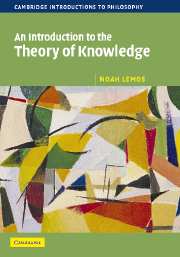Book contents
- Frontmatter
- Contents
- Preface
- 1 Knowledge, truth, and justification
- 2 The traditional analysis and the Gettier problem
- 3 Foundationalism
- 4 The coherence theory of justification
- 5 Reliabilism and virtue epistemology
- 6 Internalism, externalism, and epistemic circularity
- 7 Skepticism
- 8 The problem of the criterion
- 9 The a priori
- 10 Naturalized epistemology
- Select bibliography
- Index
2 - The traditional analysis and the Gettier problem
- Frontmatter
- Contents
- Preface
- 1 Knowledge, truth, and justification
- 2 The traditional analysis and the Gettier problem
- 3 Foundationalism
- 4 The coherence theory of justification
- 5 Reliabilism and virtue epistemology
- 6 Internalism, externalism, and epistemic circularity
- 7 Skepticism
- 8 The problem of the criterion
- 9 The a priori
- 10 Naturalized epistemology
- Select bibliography
- Index
Summary
In the last chapter we considered the view that knowledge is epistemically justified true belief. In this chapter, we shall consider some counter-examples to the justified true belief (JTB) account and consider some attempts to repair the definition of knowledge in light of these examples. The objection we shall first consider was made prominent by Edmund Gettier in his brief, yet famous, 1963 essay “Is Justified True Belief Knowledge.” The difficulty for the traditional account to which he calls our attention has become known as “the Gettier Problem.” Since 1963, it has received a great deal of attention in epistemological circles and there have been a great many attempts to solve it. It would be fair to say, however, that there remains no widely accepted solution. Many of the attempted solutions are quite ingenious and many are quite complicated and difficult to evaluate. In this chapter we shall have to content ourselves with considering some very simple proposals. The solutions we shall consider are fairly early attempts to solve the problem, solutions that appeared within ten years of Gettier's original essay. None of them are adequate, but the ways in which they fail are instructive and many of the more promising attempted solutions involve refinements and developments of these simple proposals. The three approaches we shall consider are (1) the No False Grounds approach, (2) the Defeasibility approach, and (3) the Causal approach.
Information
- Type
- Chapter
- Information
- An Introduction to the Theory of Knowledge , pp. 22 - 43Publisher: Cambridge University PressPrint publication year: 2007
